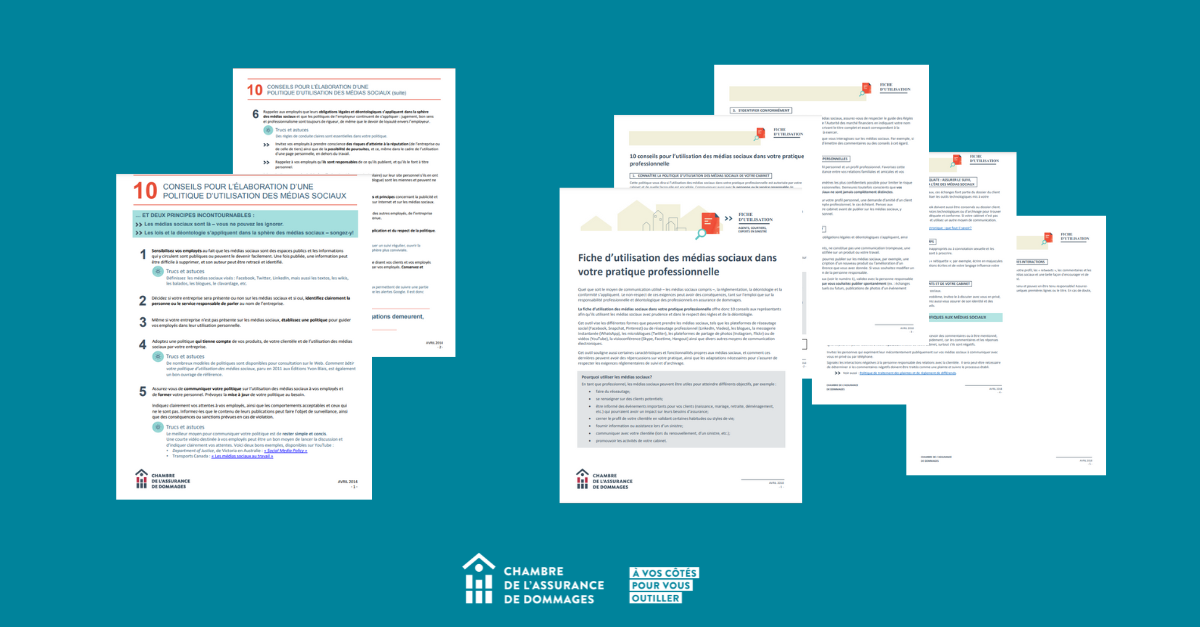Information technology: social media and AI
Regardless of the type of communication used—including social media—compliance, regulations, and ethics always apply.
The ChAD provides you with tools and resources to help you use digital technologies in your professional practice.
Social Media
Social media includes networking and sharing platforms (such as Facebook, LinkedIn, Instagram, and YouTube), blogs, wikis, and various other electronic means of communication (e.g.: a chatroom, videoconferencing, etc.).
Tips for developing a policy on social media

Whether they are present on social media or not, all firms should have a policy for using it. It helps draw the sometimes-thin line between professional and personal life in order to protect both employees’ and organizational interests.
- Why develop a social media policy?
- As a reminder that laws and ethics apply in social media just as rigorously.
- To educate employees on the realities of social media.
- To enlighten employees on the firm’s position and expectations, as well as on the consequences of using the internet improperly.
- To manage reputational risk.
The 10 Tips for Developing a Policy on Using Social Media tip sheet (in French only) includes:
-
2 essential social media principles for damage insurance,
-
10 tips for developing a policy on using social media,
-
Pointers stemming from these tips.
Tip sheet on using social media in your professional practice
The Tip Sheet on Using Social Media in Your Professional Practice (In French only) is designed for damage insurance agents and brokers, as well as claims adjusters, who wish to use social media to:
- Network,
- Find out about potential clients,
- Keep up to date with important events in their clients’ lives (birth, marriage, retirement, move, etc.) that could have an impact on their insurance needs,
- Verify their clients’ habits and/or lifestyles in order to develop client profiles,
- Provide information or assistance when a loss occurs,
- Contact clients (at renewal time, when a loss occurs, etc.),
- Promote their firm’s business.
Communicating and Conducting Business Electronically: What Do I Need to Know?
Are you thinking about switching to electronic documents and communications? Let’s review the basics of what you need to know.
Artificial intelligence
Artificial intelligence is transforming professional practices, but it also raises ethical and regulatory issues.
Guide: your professional and ethical obligations in the age of AI
It is essential that certified professionals understand the correlation between generative AI and their professional obligations to ensure its compliant and ethical use.
This guide provides :
- an overview of the three key ethical duties that certified professionals must keep in mind when using generative AI (competence, safety and transparency);
- practical tips for meeting ethical obligations;
- basic definitions;
- a description of the four main known risks associated with AI use.
Best practices: artificial intelligence in your professional practice
This tip sheet presents five essential principles to integrate into your professional practice.
- Know your employer’s policies on the use of AI
- Follow training courses on the subject offered by your employer or other organizations, and perfect your knowledge of the features and functionalities of authorized artificial intelligence systems (AIS).
- Protect the confidentiality of your customers’ and your organization’s data and personal information.
- Reread and verify information and results obtained, as AI can produce errors or false information.
- Be transparent about how the technology is used.
Training activities offered
Whether you’re a damage insurance agent or broker, claims adjuster, training manager, or manager, ChAD offers you training that reflects your practice.
